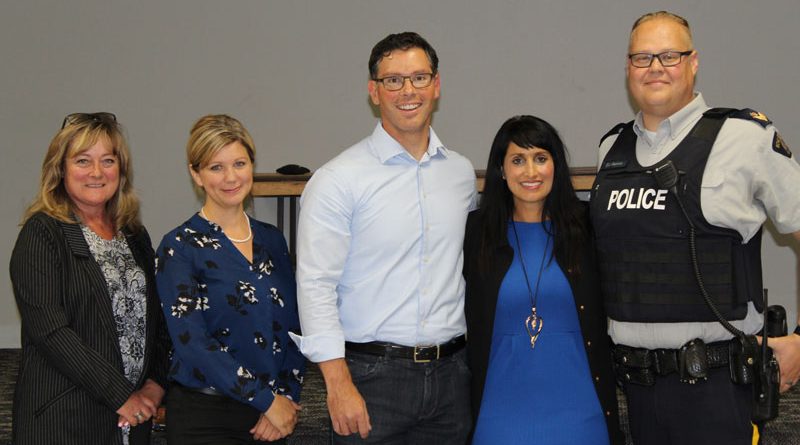Rural crime town hall in Cheadle
By Deirdre Mitchell-MacLean Times Contributor


Deirdre Mitchell-MacLean Photo
Deirdre Mitchell-MacLean Photo[/caption]Alberta’s Minister of Justice, Doug Schweitzer, was in Cheadle on Sept. 16 to listen to the public’s concerns about rural crime.
Some area politicians took in the town hall, including Wheatland County Councillors Donna Biggar, Thomas Ikert and Scott Klassen, as well as Wheatland County Reeve Amber Link and MLA Leela Aheer.
Schweitzer said the government was currently working on filling more prosecutorial positions, but many of the 45 or so residents in attendance were more concerned about the physical presence of police officers and their ability to respond to calls quickly.
While many of the personal stories were about property theft, a couple of stories were about active home invasions. Many agreed that property theft was not high on the list for police presence, especially after the fact, acknowledging that police were relied upon for personal safety.
The Minister spoke of initiatives the government was currently undertaking, such as the police costing consultation across the province. He told the crowd there were ways to increase police presence that didn’t necessarily involve adding more RCMP officers, but instead increasing the abilities of peace officers and Alberta sheriffs.
Schweitzer also mentioned that his government was looking to empower municipalities to work together to better meet their regional needs. Link said the county’s policing plan was an item she would be gathering more detail around when council reconvenes this week.
As the Minister has been touring the province, he is hearing some similarities but also some differences in what residents are looking for when it comes to crime initiatives. He mentioned that rural crime watch groups were an option in some areas but acknowledged the limited abilities those groups have. Agreeing, one resident responded she wasn’t looking for the responsibility to fall solely on citizens.
The Minister recommended that concerned residents reach out to the elected officials in their municipality, the RCMP and their MLA to work towards a solution for the problems that are apparent. Regional issues may require a regional solution that the provincial government cannot provide equally to all affected areas.
In March of 2018, the previous government passed a funding proposal to add $10 million to Rural Crime Reduction Units that exist in rural areas of the province. The funding was to support the creation of intelligence officers, crime analysts and additional civilian staff to allow RCMP members more time on patrol.
RCMP said their statistics had shown a decrease in rural property crime over the previous year by 10 per cent. Trevor Tychowsky, president of the Alberta Crime Watch Association, says that less crime is great but there is more work to do.
“It’s really dependant on the area,” he said over the summer. “In our area, we’ve still got people who are feeling crime is up because any break-and-enter is one too many for them.”
Still, the trend is moving in the right direction.
“It’s a reversal from an increase. (In) previous years, we’ve seen increases so usually it takes a lot to reverse that effect,” said Superintendent Gordon Sage of the RCMP’s Southern Alberta Rural Crime Reduction District.
